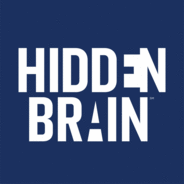We’ve all heard the saying, “What doesn’t kill you makes you stronger.” But is there any truth to this idea? This week, we explore the concept of post-traumatic growth with psychologist Eranda Jayawickreme. He finds that pain can have benefits — but not necessarily the ones we expect.Enjoy this episode? Make sure to check out last week's kick-off to our Healing 2.0 series, where we explore how the stories we tell about ourselves shape our lives in profound ways.

Wissenschaft & Technik
Hidden Brain Folgen
Why do I feel stuck? How can I become more creative? What can I do to improve my relationships? If you’ve ever asked yourself these questions, you’re not alone. On Hidden Brain, we help you understand your own mind — and the minds of the people around you. (We're routinely rated the #1 science podcast in the United States.) Hosted by veteran science journalist Shankar Vedantam.
Folgen von Hidden Brain
569 Folgen
-
Folge vom 06.11.2023Healing 2.0: What We Gain from Pain
-
Folge vom 30.10.2023Healing 2.0: Change Your Story, Change Your LifeWe all tell stories about ourselves, often without realizing we’re doing so. How we frame those stories can profoundly shape our lives. In the kickoff episode to our month-long series on healing, psychologist Jonathan Adler shares how to tell our stories in ways that enhance our wellbeing.Do you know someone who would enjoy Hidden Brain? Please tell them about this episode. And thanks for listening!
-
Folge vom 23.10.2023The Enemies of GratitudeOne of the mysteries of human behavior is that it’s often easier for us to focus on what’s going wrong than on what’s going right in our lives. Why is that? Psychologist Thomas Gilovich studies the barriers that prevent us from feeling gratitude, and how we can overcome them.Do you know someone who would enjoy Hidden Brain? Please tell them about this episode. And thanks for listening!
-
Folge vom 16.10.2023Follow the AnomaliesAs we move through our lives, we have to make decisions both big and small. Some are banal: What will I eat for breakfast today? Should I drive or bike to work? Others are more complicated: How much should I contribute to my 401k? What career should I pursue? Today on the show, behavioral economist Richard Thaler explains why our decision making is often far more nuanced than economic models would suggest.If you missed last week's show on how to keep yourself from getting conned, you can find it here: How to Spot a Scam.
